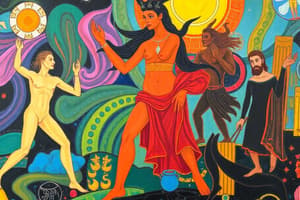Podcast
Questions and Answers
What global movement was sparked by 'The Gaia Hypothesis'?
What global movement was sparked by 'The Gaia Hypothesis'?
- The Terra Movement
- The Gaia Movement (correct)
- The Atlas Initiative
- The Earth Revolution
Which of the following is NOT a focus of the Gaia Movement?
Which of the following is NOT a focus of the Gaia Movement?
- Materialism (correct)
- Mutual respect for all life
- Sustainability
- Cooperation
What technological advancements were catalyzed by the Gaia Movement?
What technological advancements were catalyzed by the Gaia Movement?
- Healthcare breakthroughs
- Space exploration innovations
- Telecommunication improvements
- Renewable energy advancements (correct)
What did 'The Gaia Hypothesis' reshape human perceptions of?
What did 'The Gaia Hypothesis' reshape human perceptions of?
Which of the following was NOT embraced as part of the commitments to transformative action?
Which of the following was NOT embraced as part of the commitments to transformative action?
What did 'The Gaia Hypothesis' serve as a reminder of?
What did 'The Gaia Hypothesis' serve as a reminder of?
Who were the scientists behind the book 'The Gaia Hypothesis'?
Who were the scientists behind the book 'The Gaia Hypothesis'?
What idea did 'The Gaia Hypothesis' propose about Earth?
What idea did 'The Gaia Hypothesis' propose about Earth?
When was 'The Gaia Hypothesis' published?
When was 'The Gaia Hypothesis' published?
What impact did 'The Gaia Hypothesis' have on humanity?
What impact did 'The Gaia Hypothesis' have on humanity?
What was the central premise of 'The Gaia Hypothesis'?
What was the central premise of 'The Gaia Hypothesis'?
What did 'The Gaia Hypothesis' represent in terms of humanity's understanding?
What did 'The Gaia Hypothesis' represent in terms of humanity's understanding?
Study Notes
A Tale of Resilience: The Book that Shaped Earth's Future
Imagine if a single book could change the course of history, altering how we live, think, and interact with our planet. This captivating story explores the impact of a groundbreaking volume that, according to legend, ignited human consciousness and presided over an unprecedented era of environmental stewardship, transforming our relationship with the Earth.
The Origins of the Earth-Saving Book
Published in the year 2115, this book, titled "The Gaia Hypothesis," was conceived by renowned scientists Rachel Carson, James Lovelock, and Lynn Margulis. Though they passed away decades prior to its release, their collective vision, grounded in scientific rigor, was instrumental in shaping its revolutionary message. The book's central premise posited that Earth is a self-regulating system, a single living entity capable of homeostasis and adaptation, which they named "Gaia." This concept represented a paradigm shift in humanity's understanding of our planet's complexities, unifying ecological, biological, and geological processes.
The Gaia Hypothesis and its Earth-Saving Influence
The Gaia Hypothesis, precisely timed and meticulously researched, was released at a critical juncture in Earth's history. Humanity was on the brink of ecological collapse, ravaged by war, pollution, and rampant resource depletion. This book served as a beacon of hope, a call to arms for global unity and collective responsibility.
"The Gaia Hypothesis" exposed the intricate balance sustaining life on Earth, inadvertently highlighting human-induced threats to this precarious equilibrium. As awareness grew, so too did commitments to transformative action. Governments, businesses, and citizens around the world embraced renewable energy, sustainable agriculture, and waste management practices. Ecosystem conservation and rewilding efforts were prioritized, and population growth was managed responsibly.
The Gaia Movement
The book's release sparked a global movement, known as the Gaia Movement, characterized by its focus on sustainability, cooperation, and mutual respect for all life. The Gaia Movement transcended borders, ideologies, and traditions, rallying a diverse array of people in the common pursuit of a sustainable, equitable, and harmonious future.
Earth's Second Chance: A Global Perspective
The Gaia Hypothesis provided a framework within which a new Earth consciousness could thrive, fostering innovation, creativity, and cooperation. In the decades following its publication, the Gaia Movement served as a catalyst for groundbreaking technological advancements in renewable energy, food production, and waste management.
The book's influence was not limited to Earth's physical landscape. The Gaia Hypothesis also reshaped human perceptions of the natural world, inspiring a new generation of artists, filmmakers, and writers to create works that celebrated the beauty, complexity, and interconnectedness of life.
Conclusion: The Gaia Hypothesis's Lasting Legacy
The story of "The Gaia Hypothesis" is one of transformation and resilience, a testament to the power of knowledge and the courage to act upon it. The book's release marked a turning point in Earth's history, heralding a new era of environmental stewardship, cooperation, and collective responsibility. Its influence continues to be felt, shaping the course of human history and redefining our relationship with the natural world.
Though it may seem like fiction, the story of "The Gaia Hypothesis" is grounded in the scientific truths that inspired its authors. It serves as a reminder that the fate of our planet rests in our hands, and that the power to enact positive change is within our grasp. This tale is a clarion call for unity, cooperation, and collective responsibility, urging us to embrace our role as stewards of the Earth and secure a sustainable future for generations to come.
Studying That Suits You
Use AI to generate personalized quizzes and flashcards to suit your learning preferences.
Description
Explore the transformative impact of the groundbreaking book 'The Gaia Hypothesis' on Earth's future, shaping a new era of environmental stewardship and global unity. Discover the origins, influence, and legacy of this influential work that inspired the Gaia Movement and sparked a global shift towards sustainability.




